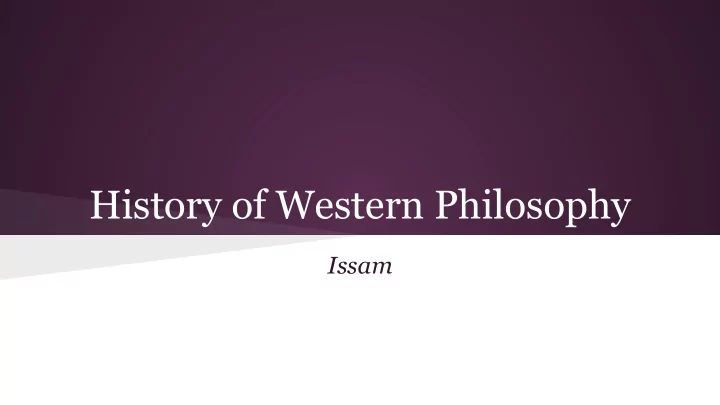

History of Western Philosophy Issam
Introduction
Introduction ● Began with the greeks ● 6th BC
Pythagorus ~569 BC ● First pure mathematician - theory of shapes, number and fate of our souls, music founded a school of mathematics - all things are numbers ○ ● Pythagorean leader philosopher in the Pythagorus society who kept their findings a secret ● Often credited with the finding of the pythagorean theorem but not for certain ○ Babylonians understood this 1000 years earlier, but Pythagoras proved it ● Motivated by the relationship between faces, vertices and edges
Pythagorus ~569 BC ● Pythagoras - Earth was a sphere in the center of the Kosmos (Universe), that the planets, stars, and the universe were spherical because the sphere was the most perfect solid figure. Aristotle - Earth must necessarily be spherical because the weight of all its parts setting towards the center would ○ naturally form a spherical shape. (Gravity!)
Pythagorus ~569 BC
Pythagorus ~569 BC ● Noticed a mathematical relationship string and note and the pitch when the string vibrated. ● Half the length of the original, an octave above the original. ● Played the seven string lyre, and learned how harmonious the vibrating strings sounded when the lengths of the strings were proportional to whole numbers, such as 2:1, 3:2, 4:3 ●
Pythagorus ~569 BC ● His theory was that the universe is founded on rational numbers. ● That came crushing as one of the pythagoras philosopher, perhaps Hippasus, whistleblew ○ Irrational number - cannot be expressed between two numbers, sqrt(2) ○ Scandal and shock, he was punished by drowning
Socrates ~399 BC ● A person never knowingly chooses to do wrong ○ wrongdoing is the result of ignorance ○ self interest prevents them from doing so ○ psychologically distraught person obsessed with cutting themselves ● No such thing as moral or ethical right or wrong until there first exists self-awareness/self-interest. ○ Right and wrong, in the perception of the actor ● Socratic method: Asking questions to stimulate thinking and discussions ○ The government of athens didn’t like it ■ Started questioning God’s existence, government’s rules and judgements ● Accused of corrupting the youth ○ Sentenced to commit suicide by drinking hemlock-based liquid ● Death migration of the soul
Copernicus ~15th century ● Earth rotated around the sun altered human’s perception of the universe - heliocentric model
Copernicus ~15th century ● During the times when the catholic church was politically powerful ● Didn’t like Copernicus theorem
Copernicus ~15th century ● Italian astronomers, Galileo and Bruno embraced the theory unreservedly ● Accused of heresy, Galileo and Giordano Bruno ● Giordano Bruno went beyond Copernicus, ○ suggested that space was boundless and that the sun was and its planets were but one of any number of similar systems ● Blasphemy - Bruno was tried and condemned to be burned at the stakes ● Galileo forced to his knees to renounce all belief ○ sentenced to imprisonment for life
John Locke ~ 1650 ● All knowledge come from experience and observation. ○ Nature vs. Nurture ● Laid the foundations of western democracy Opposition to authoritarianism ○ ● Contributed to drafting the American constitution ○ Men being by nature all free and equal None can be put out of this state without his consent ○ ● Everyone has the right to punish everyone for the evil he has done ○ all men have an obligation to other members ● Ideal state, no absolute sovereign
Bertrand Russell ~ 1890 ● Developed analytic philosophy ○ To know anything - need to know all its relations and premises ● Formal logic and science as the principal tools of the philosopher ● Clarity in arguments Breaking down philosophical position into their simplest components ○ ● End the excesses of metaphysics or pseudoscience ● Scientific method in philosophy ○ set theory ○ model theory recursion theory, and ○ ○ proof theory and constructive mathematics (considered as parts of a single area).
Computational theory of mind ~ 1990s ● Determinism ○ everything that happens or exists is caused by antecedent conditions ○ no free will ● Hilary Putnam ○ American philosopher, mathematician, and computer scientist ● Computation that arises from the brain acting as a computing machine ● Theory of computation ○ The mind is a computer, ■ takes in input representation of the world processes that representation ■ ■ derives an output
Computational theory of mind ~ 1990s ● A computer cannot compute an actual object, but must interpret and represent the object in some form and then compute the representation. ● Mental state represents something if and only if there is some causal correlation between the mental state and that particular thing.
Criticism - Chinese Room argument ● Imagine that there is a man in a room with no way of communicating to anyone or anything outside of the room except for a piece of paper that is passed under the door. With the paper, he is to use a series of provided books to “answer” what is on the paper. The symbols are all in Chinese, and all the man knows is where to look in the books, which then tell him what to write in response. It just so happens that this generates a conversation that the Chinese man outside of the room can actually understand ● Passing the Turing Test may not mean intelligence ● Can be hard to show that it is conscious
Thank you for listening!
Recommend
More recommend